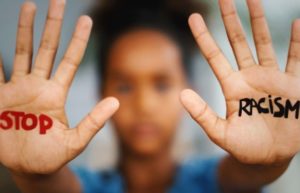At the heart of Lesley Ellis School has always been an anti-bias curriculum that is very much a part of the life of our school from preschool through grade 8. It’s infused in everything we do. It’s a way of life. From the books students read to the perspectives students study in history we look at everything through an anti-bias lens.
During the summer of 2020, while the Coronavirus pandemic was raging, so too was another pandemic and it’s one that won’t be solved with a vaccine … that of racial injustice. In September 2020, the school’s Advisory Board created an Anti-Racism Task force with a goal to thoughtfully learn more about and take purposeful action against racism. Under the leadership of Advisory Board,  38 members of the school community, both parents and faculty, came together initially to actively support this anti-racism initiative. Out of this larger group, three areas of focus were established: activism, community outreach, and community education.
38 members of the school community, both parents and faculty, came together initially to actively support this anti-racism initiative. Out of this larger group, three areas of focus were established: activism, community outreach, and community education.
As the 2020-2021 school year progressed, the task force evolved into a collaborative in order to maintain both the momentum established the first year and to stay connected with the faculty and the broader school community. The initiatives underway now are an outgrowth of the initial task force and most importantly have risen out of the commitment of the Lesley Ellis community to take thoughtful and purposeful action against racism. In the words of Maya Angelou, “Do the best you can until you know better. Then when you know better, do better.”
Microaggression Submission Form
At Lesley Ellis we have a strong commitment to diversity and equity, and we strive to ensure that every student is able to participate and thrive in a culture of inclusion. If you experience or witness a microaggression, you may report it below. Submissions may be made anonymously (you may also sign your name if you so choose) and help us keep track of how individual students and groups are experiencing our community and helps us to ensure an optimal learning environment.
What are microaggressions? A statement, action or incident regarded as an instance of indirect, subtle or unintentional messaging against members of a historically marginalized identity-based group such as, but not limited to, racial, gendered, sexual identity and religious groups.
Have you experienced / witnessed a microaggression? Statements, actions or incidents that can be classified as microaggressions are frequently experienced differently by the speaker and the listener. You are the best judge as to whether or not a comment or question directed at you or that you’ve witnessed amounts to a microaggression.
Interested in more resources? Check out the suggestions below.
Read
Some Reading Suggestions:
The Vanishing Half by Brit Bennett (fiction)
The Undocumented Americans by Karla Cornejo Villavicencio (nonfiction)
Good Talk by Mira Jacob (nonfiction, memoir)
All You Can Ever Know by Nicole Chung (nonfiction)
Born a Crime by Trevor Noah (nonfiction, memoir)
The Good Immigrant by Nikesh Shukla (nonfiction)
Braiding Sweetgrass by Robin Wall Kimmerer (nonfiction)
Consider purchasing any books listed below from a Black-owned bookstore. Here are two based in MA:
Roxbury: https://frugalbookstore.net/
Springfield: http://olivetreebooksonline.com/
- Envisioning an America Free From Police Violence and Control by Rashmee Kumar (The Intercept, October 2017)
- Wake Up America. This Is Who We Are by Joshua Zeitz (Politico, January 2021)
- Amanda Gorman’s Inaugural Poem is a Stunning Vision of Democracy by Masha Gessen (The New Yorker, January 2021)
- White rage won’t just go away by Fabiola Cineas (Vox, January 27, 2021)
- Are Prisons Obsolete by Angela Davis – a 51 page read that will completely change how you see and understand mass incarceration in the US
- Hood Feminism by Mikki Kendall – Essays about the experiences of WOC (women of color), focusing on Black Americans
- The Color of Law: A Forgotten History of How Our Government Segregated America by Richard Rothstein (see video “Segregated by Design”)
- Invisible Man by Ralph Ellison
- Americanah by Chimamanda Ngozi Adichie
- Caste by Isabel Wilkerson
- The Warmth of Other Suns by Isabel Wilkerson
Watch
- The Last Black Man in San Francisco (free on Amazon prime)
- The Pruitt-Igoe Myth
- 13th (free on Youtube)
- Ma Rainey’s Black Bottom (Netflix)
- One Night in Miami (free on Amazon prime)
- Judas and the Black Messiah
- Notes From the Field (HBO)
- John Oliver’s video explaining the origins and flaws of our policing and carceral systems
- Segregated by Design – Examine the forgotten history of how our federal, state and local governments unconstitutionally segregated every major metropolitan area in America through law and policy. Visit their website for more
- Ted Talk on Courageous Conversations
- Peniel Joseph interview – The Path to Racial Equity: Practical Steps to a More Equal Society
Listen
|